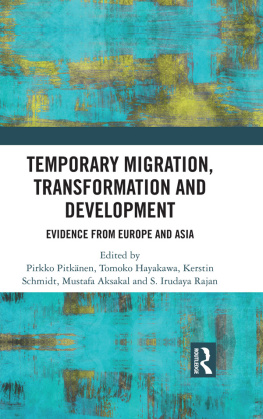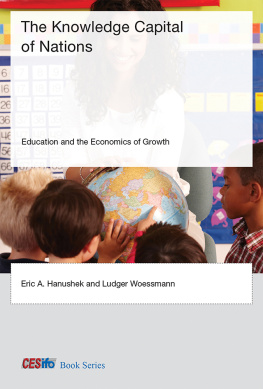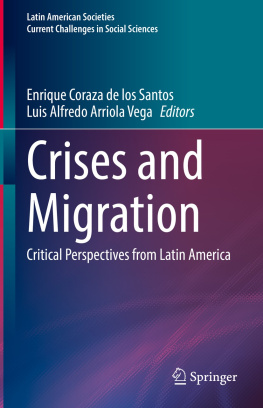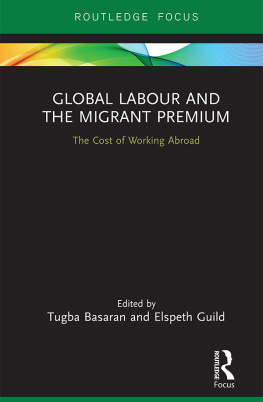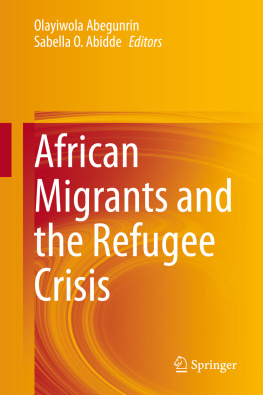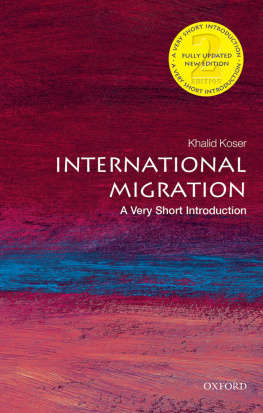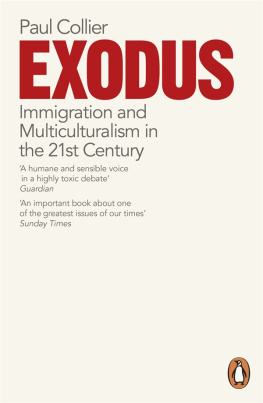Izabela Grabowska and Agata Jastrzebowska have produced a rich and insightful discussion of the state of knowledge in one of the most pressing research topics: the acquisition, transfer and utilisation of human capital by international migrants and returned migrants. They weave theoretical discussion with a review of empirical research in two of the hot spots of labour migration, Central Europe and Mexico, ranging from overviews to micro case studies that draw on their own extensive research. The volume is both an invaluable starting point for researchers new to the field, and a stimulus for more advanced researchers to rethink their understanding of this field.
Professor Allan Williams, University of Surrey, SHTM, Faculty of Business, Economics and Law
This is indispensable reading on the acquisition and transfer of human capital across international boundaries, and the implications for local development. The authors provide a thought-provoking theoretical discussion on the topic, and then explore the ways in which researchers have applied it in different national contexts. The authors impressive survey of the empirical literature on the topic demonstrates the ways in which different migrant groups from women to men to professionals to those with little schooling mobilize human capital to enhance economic opportunities. Migration and the Transfer of Human Capital is an essential read for students, scholars, and policymakers alike.
Professor Jacqueline Maria Hagan, Kenan Distinguished Professor of Sociology Fellow, Carolina Population Center, The University of North Carolina, Chapel Hill
Migration and the Transfer of Informal Human Capital
This book explores the intangible human capital which international migrants bring with them and develop further when working and living abroad, drawing on case studies and original data from Central Europe and MexicoUSA.
The book demonstrates that despite the fact that many international migrants might be working in their destination countries at a level below their formal qualifications, or else might be formally unskilled, but with practical non-validated skills, they can still acquire and enhance considerable informal human capital in the form of mind skills, soft skills, maker skills and life skills. The book analyses how migration-impacted informal human capital (MigCap) is acquired and enhanced as a result of international migration and what the opportunity and constraint structures are for their acquisitions and transfers. Adopting a comprehensive perspective, the book investigates how migration-impacted informal human capital is transferred by migrants between localities and areas of human actions and activities.
Moving beyond the focus on migration as a source of economic capital, this book demonstrates that learning by observing, communicating and doing with others, embedded in social relations can facilitate the enhancement of intangible human capital among both skilled and unskilled migrants. It will be of interest to researchers of migration, sociology, economics, management and business studies, and other related social science disciplines.
Izabela Grabowska is a sociologist and economist, full professor of social sciences and former IMISCOE board member. She specialises in international migration, human capital and social remittances. She is a professor at Kozminski University, Central Europe.
Agata Jastrzebowska is a social psychologist, assistant professor, expert in applied doctorates and leader of the educational all-encompassing campaign Speak to me kindly. She specialises in Person-Job fit. She is a post-doc at Kozminski University, Central Europe.
Routledge Studies in Development, Mobilities and Migration
This series is dedicated to the growing and important area of mobilities and migration, particularly through the lens of international development. It promotes innovative and interdisciplinary research targeted at a global readership. The series welcomes submissions from established and junior authors on cutting-edge and high-level research on key topics that feature in global news and public debate.
These include the so called European migration crisis; famine in the Horn of Africa; riots; environmental migration; development-induced displacement and resettlement; livelihood transformations; people-trafficking; health and infectious diseases; employment; South-South migration; population growth; childrens wellbeing; marriage and family; food security; the global financial crisis; drugs wars; and other contemporary crisis.
Family Practices in Migration
Everyday Lives and Relationships
Edited by Martha Montero-Sieburth, Rosa Mas Giralt, Noemi Garcia-Arjona and Joaqun Eguren
Student Migration from Eastern to Western Europe
Mette Ginnerskov-Dahlberg
Migration and the Transfer of Informal Human Capital
Insights from Central Europe and Mexico
Izabela Grabowska and Agata Jastrzebowska
For more information about this series, please visit: www.routledge.com/Routledge-Studies-in-Development-Mobilities-and-Migration/book-series/RSDM
First published 2022
by Routledge
4 Park Square, Milton Park, Abingdon, Oxon OX14 4RN
and by Routledge
605 Third Avenue, New York, NY 10158
Routledge is an imprint of the Taylor & Francis Group, an informal business
2022 Izabela Grabowska and Agata Jastrzebowska
The right of Izabela Grabowska and Agata Jastrzebowska to be identified as authors of this work has been asserted in accordance with sections 77 and 78 of the Copyright, Designs and Patents Act 1988.
All rights reserved. No part of this book may be reprinted or reproduced or utilised in any form or by any electronic, mechanical, or other means, now known or hereafter invented, including photocopying and recording, or in any information storage or retrieval system, without permission in writing from the publishers.
Trademark notice: Product or corporate names may be trademarks or registered trademarks, and are used only for identification and explanation without intent to infringe.
British Library Cataloguing-in-Publication Data
A catalogue record for this book is available from the British Library
Library of Congress Cataloging-in-Publication Data
Names: Grabowska, Izabela, author. | Jastrzebowska, Agata, author.
Title: Migration and the transfer of informal human capital : insights from Central Europe and Mexico / Izabela Grabowska and Agata Jastrzebowska.
Description: Abingdon, Oxon ; New York, NY : Routledge, 2022. |
Series: Routledge studies in development, mobilities and migration | Includes bibliographical references and index.
Subjects: LCSH: Human capital--Mexico. | Human capital--Europe, Central. | Emigration and immigration.
Classification: LCC HD4904.7 .G655 2022 (print) | LCC HD4904.7 (ebook) | DDC 658.300943--dc23
LC record available at https://lccn.loc.gov/2021034724
LC ebook record available at https://lccn.loc.gov/2021034725
ISBN: 978-0-367-82031-2 (hbk)
ISBN: 978-1-032-18224-7 (pbk)
ISBN: 978-1-003-01154-5 (ebk)
DOI: 10.4324/9781003011545


